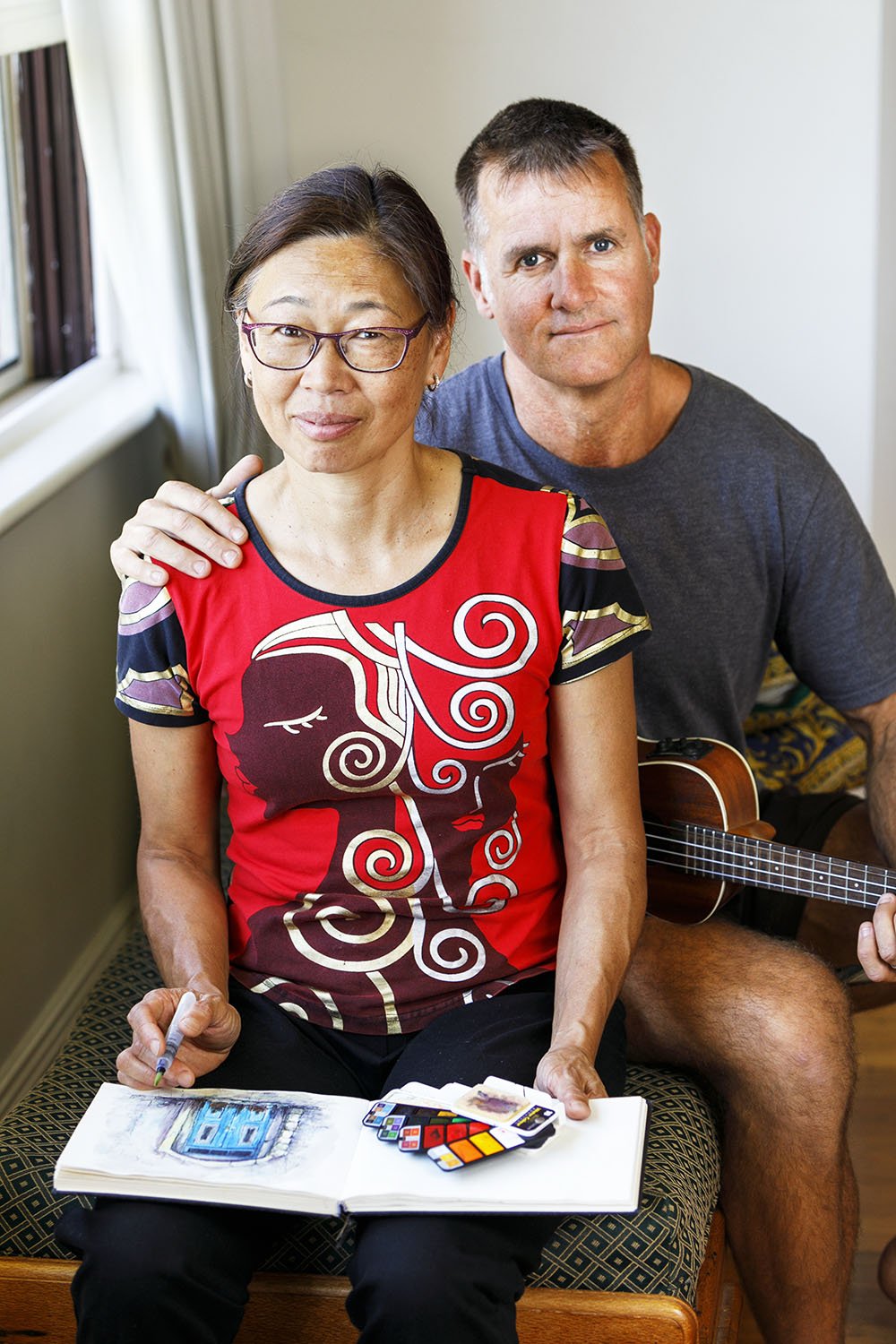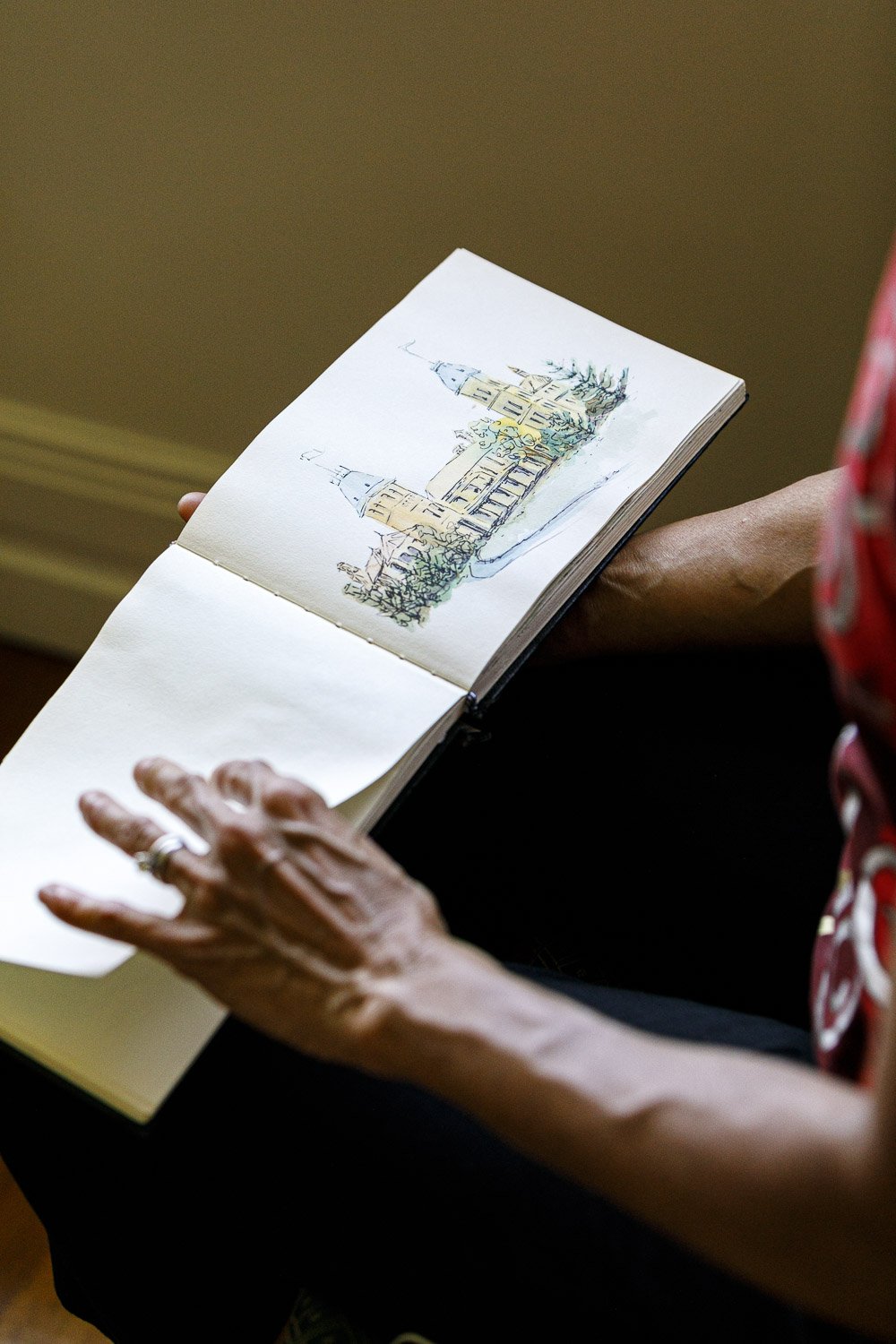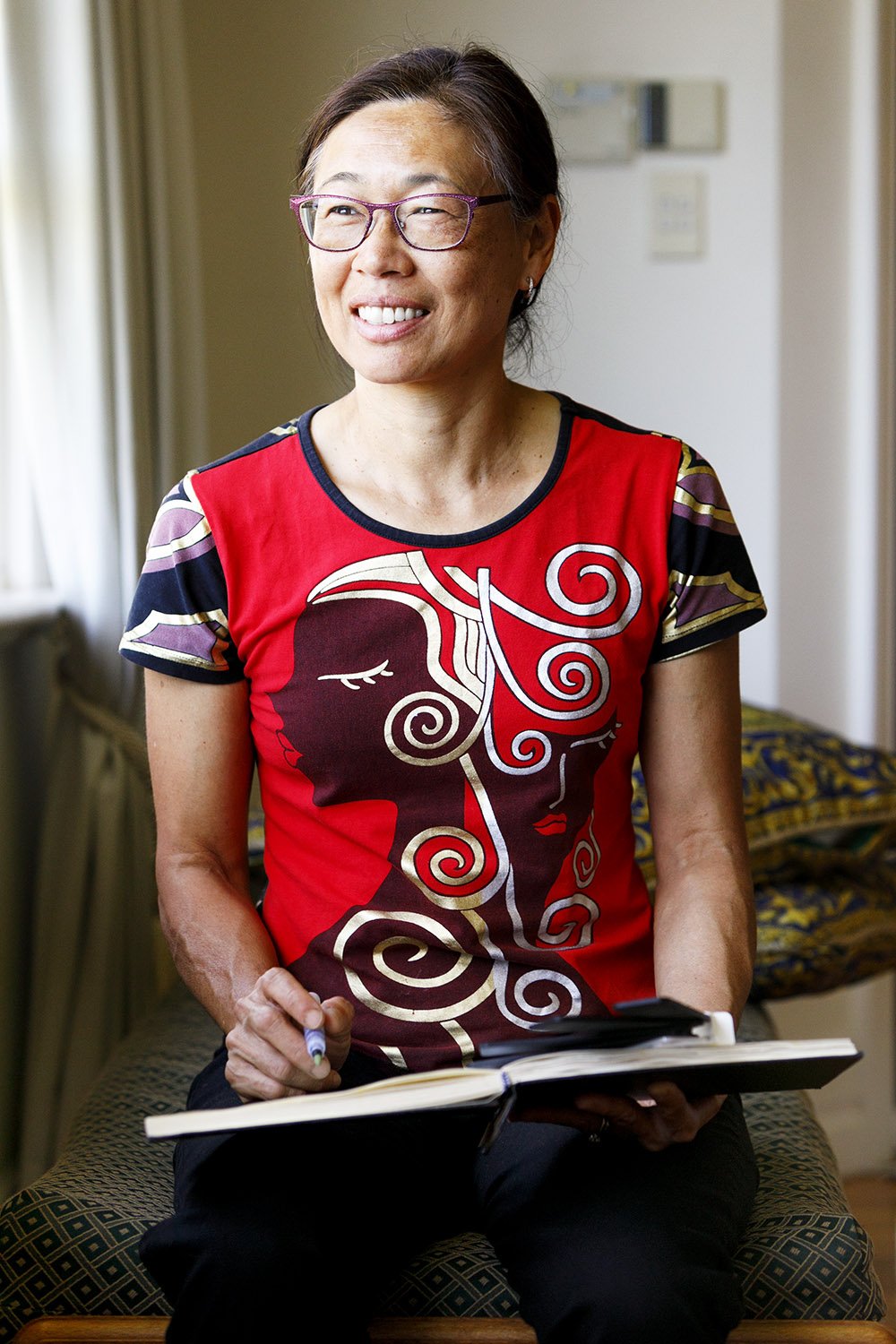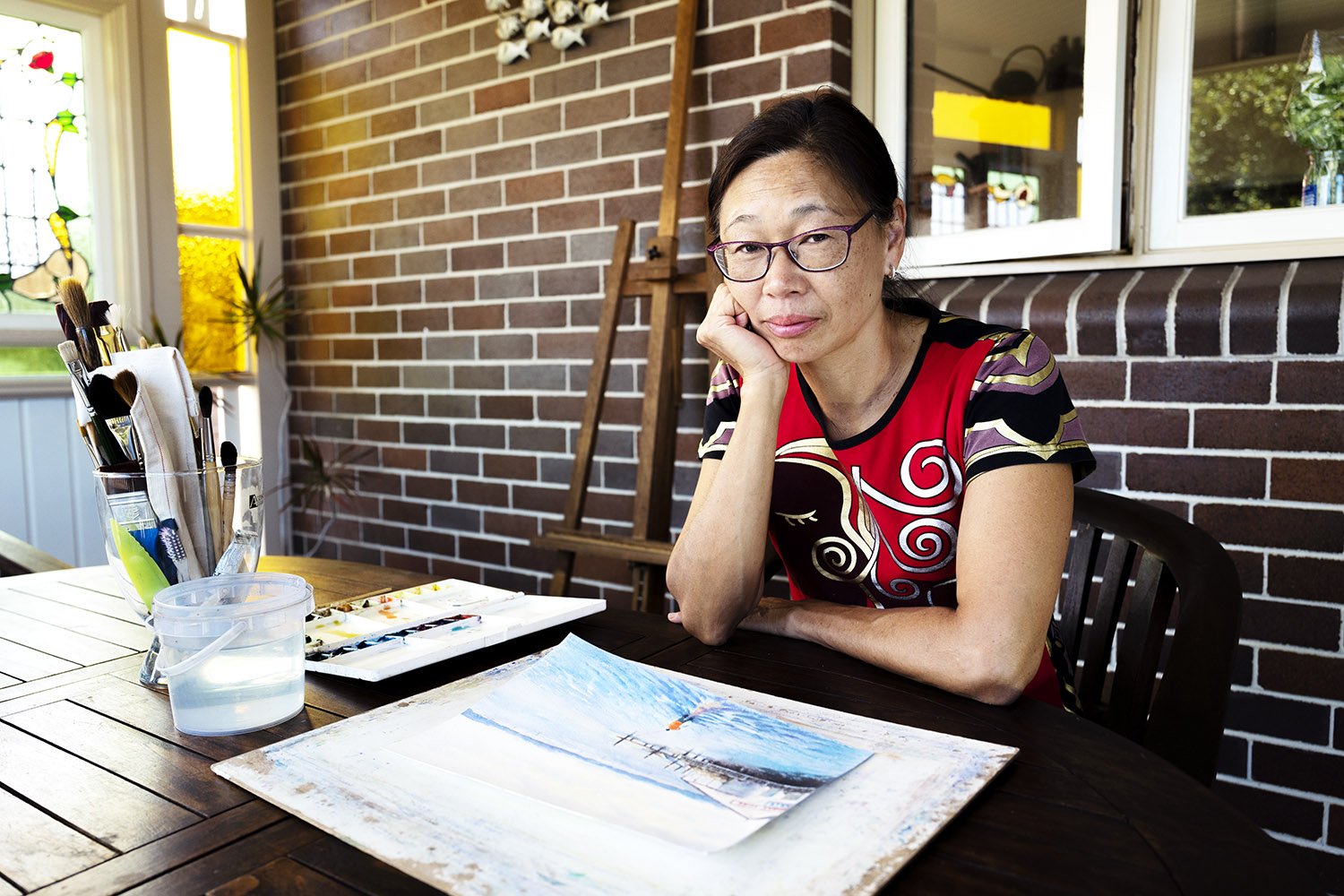Karen McFadzen & John Blake
Karen - Army, Painter
John - Army, Musician
Karen and John are a wife and husband team, both ex-military personnel and artists. Karen is a water colourist and John, a singer-songwriter. Karen is also a non-Executive Board member of the Australian National Veterans Arts Museum (ANVAM).
Their childhoods were very different from each other. Karen’s father was a Vietnam War veteran who met her mother while on Rest and Recreation (R & R) in Taiwan. Karen grew up surrounded by the camaraderie of army families from her father’s various postings.
“As part of an army family, I grew up playing with other army kids and being familiar with army life. But never did I think I was going to join the army,” she recalls.
“One day, Dad showed me a pamphlet about a new university in Canberra, called the Australian Defence Force Academy (ADFA). It paid for you to get a degree and guaranteed a job after you graduated.”
Karen had watched her older sister struggle through her studies, taking part-time jobs waitressing and having difficulties finding a full-time job. She knew she didn’t want that.
Karen signed up in 1986 and graduated from ADFA and the Royal Military College, Duntroon. She completed an Electrical Engineering degree and joined the Signals corps, focussing on electronic warfare. She was then deployed to Bougainville.
John’s childhood was quite different from Karen’s. Growing up in Melbourne, John’s father was an accomplished musician who played the trumpet at National level.
“He was a professional in a big band and there was always music in the house. But, as a child, I watched him practise scales over and over and it didn’t seem like much fun. I must have absorbed some of it, though, as I took it up later.”
When he was 18, John left home, keen to join the army. He joined the Infantry in Townsville, North Queensland and completed his service in Sydney with the Commandos. He also had a posting to the Survival Wing in Darwin.
“I had read a bunch of adventure comics and books and the army seemed to have plenty of that kind of excitement. I liked the Darwin area, as we were giving people the skills to stay alive and to keep others alive. In retrospect, it suited my nature a bit more comfortably than the Infantry.”
John also studied at ADFA, majoring in English.
“I enjoyed writing and also poetry, so I’ve probably always had an inclination to that side of things.”
A back injury confined John to an army stretcher for several months. To help him pass the time, his sister gave him a ukulele while his brother challenged him to be able to play, proficiently, Somewhere Over the Rainbow by the end of his twelve months’ recuperation.
“My creative music and songwriting journey really began by accident, from there. Later, we were at a dinner party and an old Infantry mate asked me how my ukulele playing was going. I think he was just being polite. Karen had a tape of one of my songs and played it. Another guy at the dinner party thought it was a good song and he asked if he could come round and play some guitar with me. That was about seven years ago and we’re still playing together. We were just a couple of hacks mucking around, until another fellow, who played bass, joined us as well as my sister, who sang vocals. We added a drummer and we had enough of my own original songs for a gig at the Gasoline Pony in Marrickville.
“My songs are all focussed stories. There are only two things worth writing about - love and death - as they provide the ‘left and right of the arc’. Songs about the military generally encompass both,” John explains.
“I’ve written about eighty songs now. I think Noel Gallagher, from Oasis, said he’d penned about that many before he wrote Wonderwall so I’m hoping I’m starting to wear in,” he laughs.
The catalyst for Karen’s transition to art was the death of her beloved brother, Bruce. Tragically, he died of cancer when he was a young man. At that time, she was working in the technology industry as a successful executive leader. It was a highly paced environment where she was developing and growing both businesses and talent in the Asia Pacific region.
“Are you sure you’re doing what you really want to do?” Bruce challenged.
She questioned her life and corporate career and realised it didn’t have much soul to it. So, she left.
Both Karen and John have always loved the challenge of an outdoor adventure and John had a childhood dream of sailing around Australia. They bought a boat, learned to sail and took off for six months, sailing from Sydney to Townsville and back.
“It was a big learning curve to bounce our way through all of those coastal bar crossings. It was a fantastic adventure. We loved meeting new people and experiencing a different way of life,” Karen remembers.
When they returned to Sydney, Karen started executive coaching, volunteering and exploring different interests such as drumming, ceramics and tai chi. She realised that she’d never taken time to think about what she really wanted to do, for herself.
“Some things were satisfying, but nothing was really giving me deep joy or satisfaction,” she says.
One of her ex-military friends suggested she try watercolour painting, so she did.
“I moved into a really good place. Just as John does, I lose myself in my art. I’m not great at expressing myself verbally but I’m trying, through my art, to get people to feel something. I’m not trying to recreate a picture. I’m trying to create a mood and atmosphere and to impart a feeling of peace in my artwork.”
Karen felt that, in her military life and her corporate career, the image that people saw of her was often one-dimensional.
“They only see one part of me - no nonsense, business oriented, logical and orderly. But art is satisfying to me as it enables me to be more expressive. Art is helping me grow. I like the flow of creating.”
Karen enjoys painting landscapes, street scenes and animals - particularly her two toy poodles. She’s also extending herself to drawing, figurative painting and portraits.
“My paintings are Impressionistic. Loose and suggestive.”
While Karen turned to watercolours after their ocean adventure, John asked if his band mates were keen to reform. He surprised himself, as he had previously thought he’d ‘ticked that off the bucket list’. It was then that he also made the decision to pick up a guitar, an instrument that had previously intimidated him.
“Now I’m more of a guitar player - even though lots of the songs sound better on the uke. I also play harmonica on some songs,” he says.
“A lot of people join the military for the sense of having faith in, or service to, something bigger than themselves. It could be the country, the flag, the platoon, the section. When you are younger, your sense of doing ‘good’ is, by necessity in the military, much narrower than when you look at things through older eyes. I do wonder occasionally whether writing songs that, in all probability, will never be heard can qualify as a good thing. Though difficult to answer, I am confident that, at minimum, I’m not doing harm to other people. And sometimes when you play, there are those moments when you make a connection with someone else. I feel there’s some good in that, even if just for a moment.”
John is proud to remember playing for the veteran community during the Invictus Games in Sydney in 2018.
Karen and John agree that their creative work ‘helps us throw out the rubbish, or non-essential, parts in our lives.’
Each is very quick to showcase, and applaud, the creative expressions of the other, while they both tend to be humble about their own work. Together, they talk about the challenge of transitioning from military to civilian life and the loss of connection to people and communities that is experienced after leaving the military. They both served for fourteen years. Their creative pursuits have given them that sense of connectedness.
“We belong to different communities now,” they say.
“Our art has helped us understand ourselves as well as understand others.”







